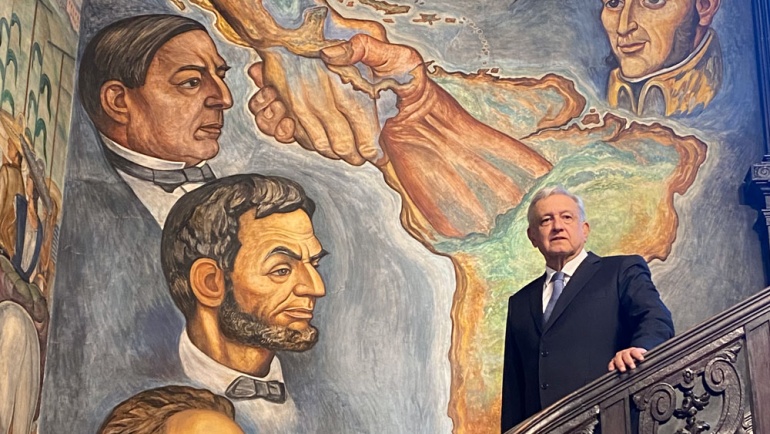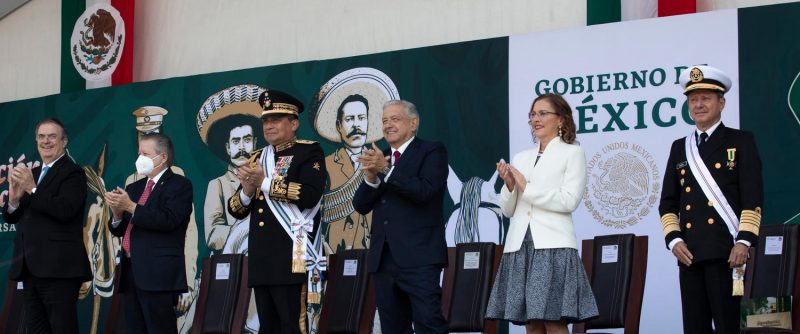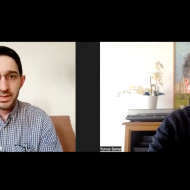Mexico’s President Andrés Manuel López Obrador is leading a careful adjusted war of words with the country’s northern neighbor, the United States. In his daily press conferences, AMLO, as the President is called in Mexico, is frequently accusing the US of violating Mexico’s “national sovereignty”.
Mexican President: The United States has Mexican journalists on payroll
On February 21, the Mexican President referred to a number of Mexican journalists and asked:
“How much do finance and enterprise organizations pay these journalists? And how much does the government of the United States pay them? We are waiting to be informed about this.”
The President continued:
“We demand from the United States government that it stops financing groups that are openly acting as opposition to governments, in my case, against a legal and legitimate government, because this is an act of intervention, a violation of our national sovereignty.”
In continuation of his press conference, AMLO called any attempts of interfering into domestic affairs of a country a “shame”.

The President’s debate with parts of the Mexican press is ongoing. Beginning of 2022, the Mexican government accelerated its steps of an energy reform. Those opposing the reform answered by attempting to dominate the public debate with publications about the one of the sons of the President.
Struggle against elites
In an interview with United World International, Citlalli Hernandez, Mexico’s governing party MORENA’s General Secretary, had described the country’s Fourth Transformation as a struggle with former elites, whose interests were affected.
“Our adversaries are very clear: The elites in the economy, the elite in politics and the elite in media. Also the elite in the academic world that has benefitted from corrupt policies. All these are losing privileges today and thus resisting the transformation” had stated Hernandez.
“Mexico is not a colony of the United States”
The Mexican President continued his accusations against the US on February 23. In his press conference, his press advisor Ana Elizabeth Garcia Vilchis stated the “organization Mexicans against Corruption and Impunity was financed by the US government and had distributed false news” concerning the Tren Maya and involved actors.
Tren Maya is one of AMLO’s leading infrastructure projects. It is a railroad circuit transiting the whole Yucatan Peninsula.
In same conference, AMLO said:
“I would like to see from Mr. Blinken that he informs us about why they are financing a group that opposes a legal and legitimate government. Why are they giving money to the group of Claudio X. Gonzales? And I would call him to get informed and invite their government not to behave in an interventionist way, because Mexico is not a colony of the United States. Mexico is a free, independent and sovereign country.”
Having long established relations with international companies, Gonzales’ family is considered one of the richest in Mexico. Gonzalez himself has founded the abovementioned organization.
US Secretary of States responds
On February 23, the US Secretary of State, Anthony Blinken made a pause in his involvement into the Ukraine crisis and declared his solidarity with Mexican journalists.
But the Mexican President rejected Blinken’s intervention, saying that journalists were not persecuted in Mexico by the state and no state crimes were committed against them, and reiterated to ask why some of them “were receiving money from the United States?”
And he further politicized the US intervention by saying the following:
“This is not a personal issue. It is about us, millions of Mexicans, who are fighting for a transformation; we want to eradicate corruption in Mexico and we are millions, and if they attack us, that s because they want that this process of transformation fails.”
200 years old politics
He also called the Department of State to “consult their ambassador before launching a tweet”.
On February 28, the President continued his “insistence with the Department of State”. He added:
“These are things that have to change in international politics. This kind of politics has been carried out for 200 years. If that doesn’t change, things will nıt get better and the world will not change.”
In the meantime, the Russian military operation in Ukraine started. Mexico condemned the operation, supported the according statement in the UN Security Council but declared it would not participate in any sanctions.
AMLO reminding of US invasions
When defending his position of rejecting invasions, AMLO reminded in detail how foreign powers had invaded Mexico several times, how the US had invaded the country and had robbed “half of our territory”.
López Obrador repeated the argument on March 8, saying his country was taking foreign policy decisions “on the ground of his own history.” He mentioned again the US invasions Mexico suffered and highlighted, in reference to the Mexican Presidential palace, “they invaded us until this point here, and they raised the American flag right there”.

His rejection of sanctions against Russia was specifically important as the Mexican government approved the sale of two oil fields in the Gulf of Mexico to a Russian company at end of February.
On March 2, he continued his critics against Washington: In reference to US financial support for the NGO Mexicans Against Corruption and Impunity, the Mexican President stated the following:
“We don’t accept this policy of the United States, which is, with all due respect, anachronistic and would be considered offensive by all states and governments. We on our turn do not send money to support the Republicans or the Democrats in the United States, which would be against international law. These kind of actions must not happen anymore.”
“US is becoming accomplices of those who want to maintain a regime of corruption in Mexico”
The Mexican President accused the United States of “becoming accomplices of those who want to maintain a regime of corruption in Mexico” by supporting the NGO. And continued: “Do the government agencies of the US not know that? (…) Does the State Department not know that? Does the CIA not know that? These and all the other government agencies do not know that and truly believe this NGO is fighting corruption? If the matter was not that serious, we would laugh about it.”
He continued:
“Where do they take the right from to intervene in a matter that only concerns Mexicans? Why do they position themselves if they were as kind of global government? And what about independence and the sovereignty of people?”
López Obrador also demanded in the same press conference that US investigates “Fast and Furious and all other operations that violated our sovereignty by introducing weapons to Mexico that killed both Mexicans and United States’ citizens.”
Fast and Furious was an operation where arms were sold from the US to Mexican drug cartels with the knowledge and observation of US government agencies. US agencies justified their non-interference with the objective of following the arms’ path to get to drug cartel pins.
In the last year, the Mexican government has opened lawsuits against US companies selling arms to Mexico.
Energy reform
Another matter of conflict between the US and Mexico is the Mexican President’s energy reform. The reform proposes a greater energy independency from the US by strengthening oil processing within Mexico and the state’s position in producing and distributing electricity. Also, all reserves of lithium in Mexico shall be explored and extracted by the Mexican government, the reform proposes.
The United States opposes the reform, as it excludes American refineries from oil processing and endangers energy transition in Mexico, closing the door to possible US investment in so-called green energy sectors.
On March 3, the Mexican President defended his energy reform with the following words:
“Just imagine what would happen if the United States decided to stop selling oil to Mexico? How long would be able to hold on? 15 days. We want to solve this problem fundamentally.”
He continued on the matter in his press conference on March 8:
“Therefore, we need to advance the energy reform, because in the case of oil, there is now a stronger state intervention and the people’s economy is taken care of. If there is no intervention by the public dominates the private interest and prevails the quest for profit. In the energy industry, the public control was being lost. Private companies and above all oil companies were dominating. Foreign energy companies were already becoming monopoles and in consequence, the price of energy was going to rise all the time.”
And at latest, the Mexican President also refused to increase oil production in face of rising global prices, at the same reassuring that prices in Mexico would not increase.
But there are also positive messages that the President sends to the United States. On March 2, he stated that US President Biden in every call reiterates, “they do not consider Latin America as their backyard” – where AMLO adds “we would not accept that anyhow”.
The model of the European Union for the Americas
Referring to the global economic rise of China, he has a proposal for the United States:
“We do not want a neighbor that is strong in arms and weak in the economy and trade. If that trend continues, what will happen? They (the US) will have to decide whether they fall to the temptation of maintaining hegemony based on arms – and nobody desires that. Instead of that, we have to think of our region as an economic unity, like the European Union, beginning with strengthening North America but thinking of the potential that the whole American continent has”.
“We have to seek an agreement as it happened in Europe, which first founded the European Community an than proceeded to the European Union. The integration of production and trade is necessary to avoid being left behind by in relations with China and Asia” said the President.
But this project requires a lot of work, states the Mexican President:
“It will need to convince those who are suspicious about the approach of intervention, lack of respect for sovereignty. And it will also need to convince those who have been hegemonic that those times are gone. It is not anymore the times of spies and promotion of coup d’états, not anymore the times of installing or toppling down governments, or embargoes, which all are methods that belonged to the Middle Ages. This cannot be anymore.”
US officials travelling to Mexico
For the time being, energy matters seem to be leading the US-Mexican agenda from Washington’s point of view.
US Special Presidential Envoy for Climate John Kerry has travelled to Mexico City on February 9, 2022 to engage with government counterparts and accelerate cooperation on the climate crisis, including opportunities for expanding renewable power generation and creating a sound investment climate.
The U.S. Department of State Under Secretary for Economic Growth, Energy, and the Environment, Jose W. Fernandez, travelled to Mexico from February 27-March 3, 2022, also discussing energy matters.
But it seems the travels had not much success: “Mexico’s Democracy Is Crumbling Under AMLO” titled an analysis published by the Washington Post on March 9.
The Rio Grande seems to have troubled waters ahead.









Leave a Reply